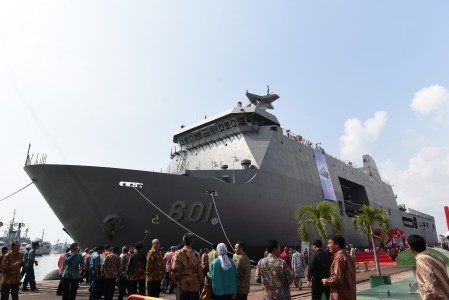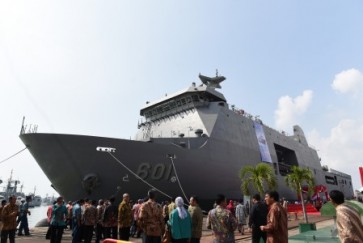Popular Reads
Top Results
Can't find what you're looking for?
View all search resultsPopular Reads
Top Results
Can't find what you're looking for?
View all search resultsIndonesia's state-owned manufacturing enterprises aim to go global
Indonesian economy is facing two intertwined problems: declining export share and declining manufacturing share. These challenges have led the government under President Joko “Jokowi” Widodo to emphasize the importance of “production-driven economy” and exports of manufacturedgoods.
Change text size
Gift Premium Articles
to Anyone
 Dozens of guests observe Strategic Sealift Vessel BRP TARLAC (LD-601), at a vessel dock at Tanjung Perak Seaport in Surabaya on May 8. It was a debut export of warship by state-owned ship builder PT PAL that was ordered by the Philippine Defense Ministry. The vessel arrived in the Philippine on Friday. (Antara/Zabur Karuru)
Dozens of guests observe Strategic Sealift Vessel BRP TARLAC (LD-601), at a vessel dock at Tanjung Perak Seaport in Surabaya on May 8. It was a debut export of warship by state-owned ship builder PT PAL that was ordered by the Philippine Defense Ministry. The vessel arrived in the Philippine on Friday. (Antara/Zabur Karuru)
I
ndonesian economy is facing two intertwined problems: declining export share and declining manufacturing share. The exports-to-GDP ratio decreased from 34 percent in 2005 to 21 percent in 2015, the lowest since 1986. Over the same period, the manufacturing share of GDP declined from 27 percent to 21 percent, the lowest since 1988. These challenges have led the government under President Joko “Jokowi” Widodo to emphasize the importance of “production-driven economy” and exports of manufactured goods.
In this regard, Indonesia’s state-owned enterprises (SOEs) in high value added manufacturing sectors have recently shown impressive progress.In March 2016, railway company Industri Kereta Api (INKA) exported 15 train cars, the first batch of 150 train cars ordered by Bangladesh Railways; marking the first time INKA had exported passenger trains to a foreign country.
In May, the ship manufacturer PAL Indonesia completed its first warship export by delivering a strategic sealift vessel to the Philippines’ defense department; PAL is currently building a second warship for the same client.
In recent years, the state-owned weapons manufacturer Pindad has signed contracts with a range of countries including Laos, Nigeria, the Philippines, Thailand, and the United Arab Emirates. An airplane producer, Dirgantara Indonesia (DI), expanded its exports of multi-purpose aircrafts, called CN-235s, to Thailand and Senegal at the end of 2016.
According to these SOEs’business plans, the internationalization strategy has just begun. INKA aims to enter Egypt, Myanmar, Pakistan, Sri Lanka, and Thailand, and PAL Indonesia plans to penetrate Southeast Asia and the Middle East. Fueled by around 200 letters of intent for purchase from domestic and foreign airlines, DI is expected to start commercially manufacturing homegrown 19-seat commuter planes, called N-219s, in 2017.
Pindad is considering foreign direct investment and cross-border acquisitions and is already strengthening international partnerships to expand its global footprint.
On top of being a major client of SOEs in strategic industries, the government is playing a pivotal role in stimulating SOEs’internationalization. In recent years, the government has directly injected funds to aid SOEs’production modernization and product development.

















